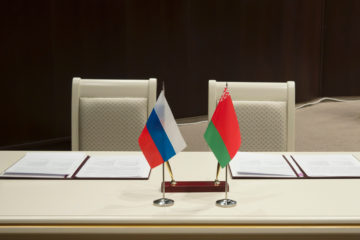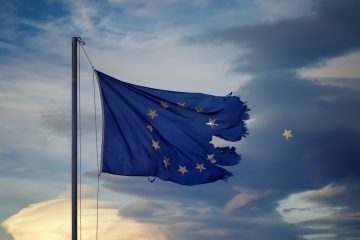
Kidnapping of Roman Protasevich will force pariah Belarus more firmly into Russia’s orbit
The taking of journalist Roman Protasevich from a commercial airline flight has further estranged Belarus from an outraged west and will force the country deeper under the influence of an increasingly powerful Russian Federation. Protasevich and his girlfriend Sofia Sapega were detained at Minsk airport after a Ryanair flight from Athens to Vilnius, Lithuania was forced to make an emergency landing in the Belarusian capital on May 23. The incident sparked widespread backlash from the west, leading the UK and the EU to ban Belarusian aircrafts from entering the their airspace and the latter announcing preparations for another round of sanctions. The incident was received very differently in Russia. Moscow expressed support for Lukashenko’s decision – albeit relatively mutedly – …
What if We Talked about Foreign Policy? Italy’s Opportunities for Global Leadership in 2021
After the Cold War and the fall of the First Italian Republic, Italy struggled to formulate a coherent foreign policy strategy. Generally, foreign policies at global level during the Cold War era were dictated by the bipolar relationship between the United States and the Soviet Union. Italian foreign policy, therefore, was a function of the United States’ sphere of influence and interests, and Italy was often a bridge and interlocutor for the Americans to the Middle East or Eastern Europe. With the collapse of the bipolar system and the disintegration of the major Italian political parties that were the core political actors in the aftermath of World War Two, Italian foreign policy was partially dictated by individual figures and was …
Italy’s Other Wave: Protests during the Second Lockdown
Italy was the first Western democracy to impose a country-wide lockdown in response to the COVID-19 pandemic. Despite successfully curbing the number of infections in the first half of 2020, Italy saw its cases increase again in October, prompting Prime Minister Giuseppe Conte and local governments to announce new restrictions to curb the cresting second wave. Despite the clear memory of the significant death toll and warnings of the dangerous winter to come, however, these announcements have been met with opposition. On the evening of the 23rd October, thousands gathered in the streets of Naples to protest against the forced closure of shops and restaurants and the threat of a local lockdown. A group of about 300 people—including youth, extremist political groups, and football hooligans—escalated into a violent protest, attacking police officers, burning cars, and vandalizing private …
Undoing the Fixed Term Parliaments Act
In the month of November, Boris Johnson’s government will most likely instate a committee review of the Fixed Term Parliaments Act (FTPA) with the ultimate goal of fully repealing it. This Act, introduced in 2011, was supposed to fix the date of the general election to be every five years. Its planned repeal is part of a number of sweeping constitutional reforms that would empower the British executive over Parliament, which the Conservative Party vowed to push for in its 2019 electoral manifesto. With the ongoing global pandemic and the protracted Brexit talks with Brussels, the Conservative’s plan to repeal the FTPA have largely flown under the public’s radar. Yet if a repeal goes through, it would have a significant …
Coronavirus and the Crisis of State Identity in Belarus
Even after achieving independence, Belarus is still known as the most ‘Russianised’ of the post-Soviet countries. Its unique retention of Soviet structures even after the breakdown of the USSR demonstrates the lack of cohesive state identity in the country. This has allowed Alexander Lukashenko, the country’s first and only president to date, to concentrate more and more power in his own hands. This article argues that Belarus’ crisis of state identity has enabled Lukashenko’s populist and, subsequently, authoritarian nature. Further, the lack of state identity has allowed him to neglect the severity of the Coronavirus pandemic. Belarus’s independence in the post-Cold War era was not a result of a long struggle, which hampered the formation of national identity. In 1991, …

Can Europe Make It? The EU After Brexit
Brexit has weakened populists on the continent? This is wishful thinking. No longer willing to leave the EU, instead populists are determined to take it over. Brexit is a moving target. Each time we think we have a deal, the British House of Commons decides to re-think. It’s like the famous passage from T.S. Eliot: “Time yet for a hundred indecisions/And for a hundred visions and revisions,/ Before taking a toast and tea.” Boris Johnson expected the Parliament to approve the exit deal he reached with the EU. Instead, the Parliament voted for an amendment tabled by a Tory MP, Sir Oliver Letwin. The amendment withholds approval of the deal, until the legislation to enact it is safely passed – …
Belarus’s 2019 parliamentary election: consequential or not?
On 17 November 2019 Belarus chooses a new parliament. The last parliamentary elections, held in September 2016, brought two non-loyalist candidates into the lower chamber for the first time in more than a decade. Although the role of the parliament is relatively insignificant in the Belarusian political system, the outcome of the poll later this month will send an important signal about Belarus’s domestic trajectory. Moreover, the international response could determine the direction of travel for Belarus’s relations with Russia and Western states as it moves towards presidential elections in August 2020. 2016: A confidence trick? Elections in Belarus usually provide few surprises and critics fairly dismiss parliamentary ballots as inconsequential affairs. In the earlier part of his rule, President …

Most people in separatist-held areas of Donbas prefer reintegration with Ukraine – new survey
With renewed negotiations to end the conflict in Ukraine’s Donbas region on the horizon, the views of those people most affected by the war – the residents of eastern Ukraine – should be taken into account. Russia insists that the people living in areas of the Donbas currently controlled by separatists, who it supports, do not what to reintegrate with Ukraine. But two surveys I carried out in the Donbas in 2016 and 2019, revealed that a majority of those we surveyed in areas not controlled by the government would prefer to be part of the Ukranian state. The war in the Donbas started more than five years ago and has cost in excess of 13,000 lives. At least 1.4m …









